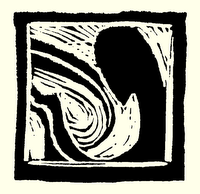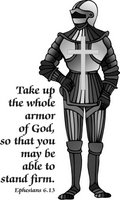Gear Up
 Ephesians 6:13-20
Ephesians 6:13-2012th Pentecost B
Batman is the most interesting superhero, partly because he doesn’t have superpowers. He has courage, and some well honed skills, but mostly what he has is some great gear. In Batman Begins we see him put hi
 s gear together from military equipment the research and development section of Wayne Enterprises put together. He has his modified Nomax suit, painted black, and then the memory fabric to make his wings. It isn’t magic that makes him what he is - it’s the batsuit.
s gear together from military equipment the research and development section of Wayne Enterprises put together. He has his modified Nomax suit, painted black, and then the memory fabric to make his wings. It isn’t magic that makes him what he is - it’s the batsuit.We have wonderful kinds of gear available to us to help us do things we couldn’t normally do. People can now dive into the glaciers of Antarctica because of wetsuits and diving equipment, although it is still terribly cold and very dangerous. People can walk on the moon with the right gear. Environmental suits help in toxic situations.

We everyday people have gear that protects us as we do the things we do: waterproof hiking boots, breathable waterproof jackets, and neoprene gloves to help with northern MN outdoor adventures; SPF lotion for the sun; biking helmets, football pads, rollerblading wristguards, hockey helmets.
Good gear has not always been available to common people, but protective gear has long been available to certain soldiers. The armor that is alluded to in today’s scripture is the Roman armor that the people of the early Church, in the Roman Empire, were very familiar with and probably quite frightened of. The armor consisted of a helmet, a breastplate, a belt, foot coverings. Except for the sword these ar
 e all defensive weapons that are mentioned. They are to protect the soldier in his work.
e all defensive weapons that are mentioned. They are to protect the soldier in his work.The writer of Ephesians is not telling the people to get armor, and they wouldn’t be able to. He is not saying that the people of the church must have equal weapons or equal defenses to be all right. He is telling the people of Ephesus that there is another whole level of protection that is available to them that is far more important than the armor that they see on the soldiers. He describes this as putting on the armor of the Romans as a way to make his point - that armor isn’t that powerful. There is something that is far more powerful than metal. You have that available to you. This is not a militaristic reading - the violence is undermined and subverted. The writer of Ephesians takes the church to a whole new place.
They are to put on God. They are to put on God in truth, in righteousness, in peace, in faith, in salvation, in the Spirit, in the word. These are not physical weapons but elements of protection. These do not protect the body from swords but protect something much more important - the spirit, the soul. The Christians are urged to put on the presence of God, to put on Christ, one piece at a time, with all the ways they can, to protect that which is most precious, to protect what the Roman soldiers cannot destroy.

We do not have soldiers coming after us this morning, so the text doesn’t have the same punch. But we too have souls to protect; we too have spirits that need to be cared for. We live in a world of fear, and that is a danger to our spirits. We live in a world fraught with meaninglessness, and that is a danger to our being. So we too are invited to put on Christ, to put on the protection of God.
We do this through our spiritual lives, our practices of faith. Bishop Dyck has laid out a practical way we can put on Christ through a spiritual pyramid. She lists activities, practices -- reading the Bible and daily prayer, worship, service, church work, retreats -- that we can participate in that will build up our strength, help us put on Christ.
Here at Hope we have a Covenant Discip
 leship group and we will be inviting you to join new groups this fall. In Covenant Discipleship we meet weekly to discuss ways in which we put on Christ as we talk about our spiritual practices of acts of compassion, acts of justice, worship and devotion. We support one another and hold one another accountable to the ways we put this stuff on in our daily life, the way we use it.
leship group and we will be inviting you to join new groups this fall. In Covenant Discipleship we meet weekly to discuss ways in which we put on Christ as we talk about our spiritual practices of acts of compassion, acts of justice, worship and devotion. We support one another and hold one another accountable to the ways we put this stuff on in our daily life, the way we use it.In Eugene Peterson's The Message he interprets part of this reading of Ephesians this way: “Truth, righteousness, peace, faith, and salvation are more than words.
Learn how to apply them. You’ll need them throughout your life.”
We aren’t superheroes. We don't have superpowers. We aren't soldiers. We don't have super strength. We don’t need to be. We’ve got great gear. We just need to put it on.


